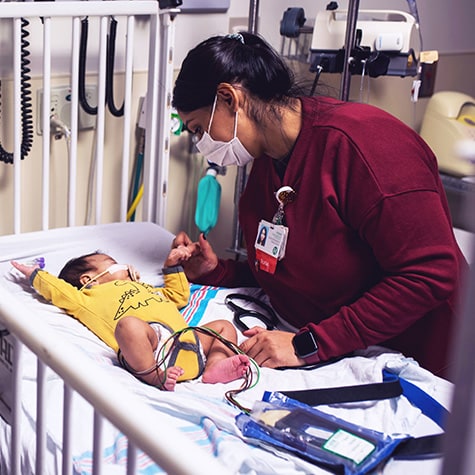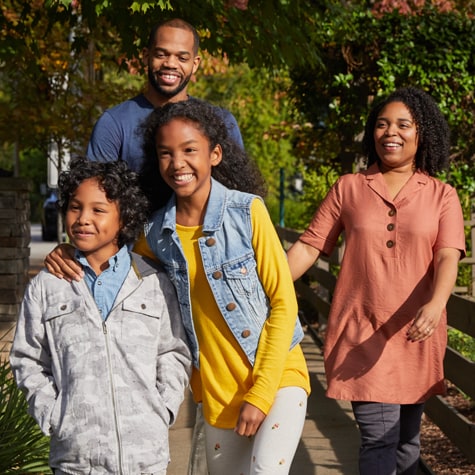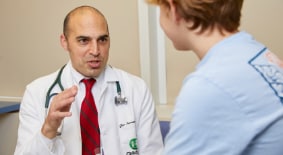How Does Your Child’s Heart Work?
Updated 9/5/23
Learn about your child’s heart to keep it healthy and strong.
The human heart has four chambers, separated by walls of tissue called septa and aided by four heart valves (tricuspid, pulmonic, mitral and aortic), that open and close with flaps, allowing blood to flow in only one direction.
The two upper chambers of the heart are the atria, which receive incoming blood from the body. The right atrium receives deoxygenated blue blood from the body, while the left atrium receives oxygenated red blood from the lungs. For fetal circulation, there is a special hole between the left and right atria called the foramen ovale that diverts blood away from the lungs and goes directly to the rest of the fetus’s body. This hole typically closes after birth.
The lower two chambers of the heart are the ventricles. The right ventricle receives deoxygenated blue blood from the right atrium and pumps it into the lungs to be filled with oxygen; the left ventricle receives red oxygen-rich blood from the left atrium and pumps it out to the body.
Congenital heart defects (CHDs) may involve a valve, a chamber, the septa, an artery or a blood flow issue. Some CHDs, such atrial septal defect (ASD) and ventricular septal defect (VSD), can be detected when a doctor listens to the heart with a stethoscope and hears a “murmur.”

Your Child's Heart Explained
-
How Your Child's Heart Works
Watch us explain what a child's heart looks like and how it works.
Your child’s heart is a muscle that is the size of a fist. The single purpose of your child’s heart is to pump oxygen and nutrient-rich blood throughout their body, which beats 100,000 times per day and pumps about 2,000 gallons per day. It is a vital part of their cardiovascular system, which includes all the blood vessels that carry blood from the heart to the body’s tissues and back again.
“The heart is designed to allow blood to flow in a very specific way,” said Andrew Dodgen, MD, Pediatric Cardiologist at Children’s Healthcare of Atlanta Cardiology in Columbus, Ga. “In the case of CHDs like ASD or VSD, blood passes through the heart abnormally, causing turbulence that can be heard.”
More severe forms of CHDs may cause:
- Decreased oxygen levels, giving your child a “blue” appearance
- Swelling in hands
- Swelling in face
- Enlargement of the liver

At the Children's Heart Center, your child’s heart is in good hands. Our team provides exceptional treatment to children of all ages who have heart defects such as heart murmurs or tetralogy of fallout. Due to our tireless work, U.S. News & World Report consistently ranks us as a top pediatric heart program.
learn moreLearn About Common Heart Conditions in Kids
Teaching your child or teen healthy habits early on in life can help them learn how to keep their heart strong. It’s also important to make sure that healthy living is a priority for your entire family. Here are some ways to instill habits that will support your heart-healthy child or teen:
- Aim for your child or teen to get 30 minutes of physical activity every day.
- Limit exposure to electronics including television, video games and non school-related computer activities.
- Encourage healthy food choices such as whole grain crackers, string cheese, hummus and vegetables, and Greek yogurt.
- Avoid unhealthy foods such as fast or fried foods, sodas and candy.

Keeping Your Child Strong4Life
Armed with a team of Children's doctors, therapists, nurses, registered dietitians and other wellness experts, Strong4Life has resources to help busy families raise healthy, safe, resilient kids.
Learn moreAndrew Dodgen, MD, is a pediatric cardiologist caring for children with congenital and acquired forms of heart disease. His areas of focus include fetal cardiology, cardiomyopathies and inherited cardiovascular disease.
This content is general information and is not specific medical advice. Always consult with a doctor or healthcare provider if you have any questions or concerns about the health of a child. In case of an urgent concern or emergency, call 911 or go to the nearest emergency department right away. Some physicians and affiliated healthcare professionals on the Children’s Healthcare of Atlanta team are independent providers and are not our employees.
Contact Us 404-256-2593



